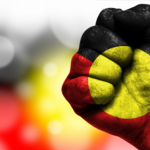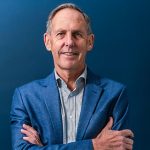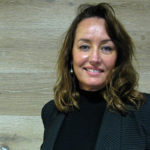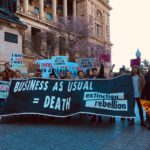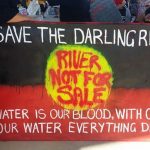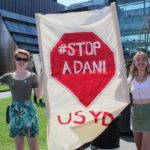Saving the Rivers from Corporates: An Interview With Water Activist Bruce Shillingsworth
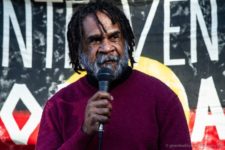
News of the environmental devastation taking place along the Barwon-Darling river system in north western NSW hit the city last summer, when reports of several mass fish kills near the town of Menindee made headlines.
Part of the larger Murray-Darling river system, the Barwon-Darling runs down from the NSW-Queensland border right through the main cotton growing areas around towns like Walgett, Bourke and Brewarrina.
Allegations of water-theft by some local irrigators for the farming of cotton first came to light in mid-2017. And the implication was that some high-level public service officials had been turning a blind eye to the activity.
Centre Alliance senator Rex Patrick flew over southern Queensland in late January to find cotton farms with large stores of water. And while there was no suggestion these irrigators were breaking any laws, further downstream in NSW, the Barwon-Darling was a series of muddy pools.
Frontline of the macro crisis
The NSW Natural Resources Commission announced late last month that the Barwon-Darling is an “ecosystem in crisis”. It put the situation down to the water sharing plan that covers the area in the north of the state and called for its desperate overhaul.
The commission said the “insufficient ecological, social and cultural outcomes” in the area are due to the rules governing the plan, “an intense drought”, “significant volumes of upstream water extractions” and an “apparent climate shift”.
Of course, this “apparent” shift in the climate isn’t just confined to northern NSW, as it’s part of the global climate and ecological crisis that humanity’s now facing, with the Intergovernmental Panel On Climate Change warning last October that nation’s only have 12 years to curb a catastrophe.
And it’s the Aboriginal communities that live along the western NSW rivers that are facing the worst of the local crisis. The traditional custodians have preserved the river system for tens of thousands of years. And they’re most aware that what’s happening now is an anomaly.
The rightful protectors
Bruce Shillingsworth is a First Nations artist and rights activist. The Muruwari and Budjiti man has been prominently campaigning for just management of the river system. And as part of that, he launched the Water for Rivers campaign earlier this year.
In late September-early October, Mr Shillingsworth is holding the Water for Rivers Corroboree Expedition that will travel through the towns that have been most devastated by water shortages in western NSW. And he’s partially funding the project via his recent art exhibition.
Sydney Criminal Lawyers spoke to Bruce Shillingsworth about what’s in store for the region this coming summer, why his people are being hit hardest by the crisis, and how he’s calling on First Nations peoples to take the lead role in healing the rivers.
Firstly, the Murray-Darling river system in western NSW is going through a crisis. You’ve launched the Water for Rivers campaign in response. Just how bad is it out there?
Over the Christmas break, when all those fish kills happened, I was up on the Darling River. We said we needed to do something about it. We came back down to Sydney. We talked to a few universities and we did a few rallies.
I said, “Look, this is what is happening to our rivers. Why are they drying up? Why are some of them polluted? Why are the fish dying? Why is the environment dying? Why are our communities suffering?” That’s the main problem. And it’s why I got out and did something about it.
At the moment, there’s a little bit of water in the river. But, it’s not enough to solve all the issues that we still have. That’s with the water allocations and the pumping of the waters. They still have control of it. Who’s managing our rivers? Have First Nations peoples been involved in decision-making?
So, there’s a lot of stuff that we need to start looking at to make people accountable and start fixing our rivers.
You’re saying it’s a bit better at present. But, going into the summer period is it likely that we’ll see more of what we saw last year?
A similar thing will happen again in another 3 or 4 months time. Our rivers will still dry up. The drought was part of it. But, it’s the pumping out of the water and the water allocation to the big corporates and companies along the rivers with the cotton that are taking a lot of our water.
Those are the issues that we need to be dealing with. Our communities are still suffering because of that. We still haven’t fixed a lot of these problems, with the filters on the taps and the tanks, and each household storing rainwater.
The management of our rivers. Who’s managing them at the moment? The Murray-Darling Basin Authority is still managing our rivers.
How would you describe the process that’s led to the depletion of waterways?
It’s the over pumping of the water: the irrigation. The big irrigators are taking a lot of the water out of the river. And not letting the river run freely. As quick as the flood comes down and the rivers fill up, the quicker they pump it out.
In your understanding, what needs to be done to rectify this situation?
The government needs to make some proper policies. We’ve got to stop these big irrigators. We’ve got to put limits on how much water they’re allowed to pump. We’ve got to make sure there’s water there for our communities. And make sure small farmers get a portion of that.
We need to look at the sharing of the water source. Not any particular group, but the big corporates are claiming our water systems. That’s what we’ve got to stop.
What’s going on in the Murray-Darling is part of a larger climate crisis that humans are facing at present. How dire would you say this emergency is?
It is an emergency. I took my mother there just after the Christmas break. She’s 90 something. And she walked the river. She said that she’d never seen the river in that state in her lifetime. She lived on the river. She camped on the river.
It’s not just affecting First Nations people. It affects non-Indigenous people. But, First Nations peoples are getting the brunt of this, because 60 percent of our NSW population lives upon the river system – lives along the Murray-Darling. They spend most of their lives there.
They rely on that water. They rely on that river as a food source. A lot of the sacred sites are along the river. A lot of stories and knowledge that Aboriginal people have relates to the water. They spend a lot of their recreation time along the river camping and fishing.
What do they do now when there is no water in the river?
You’ve been out at climate rallies of late, with groups like the Extinction Rebellion. What impact do you think these mobilisations are having? And is there a need for escalation?
We need it to increase. More grassroots people need to start coming together in solidarity. We need to protect our environment. We need to protect our natural resources: the things we rely on, the things that keep us alive, the things that sustain us.
We get our food from the environment. So, why are we then destroying it? This is what the new generation is saying. They want to see better conditions. They want to see change. They want to see these changes in their lifetimes. They want to see a better outcome for their children and their children’s children.
We don’t want to see it in the state that it’s in today. We want to change it. We want to fix it for our future generations. And by doing that we need to do something now.
I said in a speech the other day, “We are the first generation to experience climate change. And we may be the last to make a decision on it or have the chance to change it.”
You’re holding the Water for Rivers Corroboree Expedition. What will that entail?
We want to get a gathering of people. We want to go back to what the First Nations peoples have been doing for thousands and thousands of years. And that’s gathering along the rivers. Doing the ceremonies. Singing the land. Singing the river. We want to bring the rainmakers back to the land and start healing it.
We want the biggest gathering of people in Australia to come and join us in those river towns: Walgett, Brewarrina, Bourke, Wilcannia, Menindee. And sit with those old people and listen to their knowledge – the passing down of knowledge.
There will be education for non-Indigenous people. We’ll have song. We’ll have dance. We’ll have music. We will be listening to story-telling.
And just listening to the voice of those communities that have never been listened to. We want to give the voice to those that are voiceless. Those communities that no one seems to be listening to. The government’s not listening to.
So, we want to go to these communities and say, “Here we are. We support you. We listen to you.” And this is what we’ve got to do. We’ve got to make a noise. And we’re going to make a big noise.
We’re going to send a message right across Australia and the world to say, “What’s happening with our community? And what’s happening with our rivers?”
And lastly, in a recent documentary you’re standing in the Darling River, which is completely dry. And you call on the various First Nations from around the continent for help.
Do you see this as a time when a change will take place in regard to how the environment is being handled? And will this involve First Nations peoples taking a more prominent role than what they’re being afforded at present?
First Nations people have got to stand up and take that first role. We are the decision makers of our communities, our environment and our nations. And because we are the protectors of the environment, we need to start stepping up and telling people that this is what we need to do.
The old knowledge that our old people have had for thousands and thousands of years says that we need to protect the environment and natural resources: our trees, our rivers, our animals. They are becoming extinct. And they’re being exterminated.
When you look around us today, we’ve got global warming, our lands are polluted, our rivers are polluted, our food is becoming toxic and our communities are sick. When we get a sick river, we get sick communities. And then we get sick people.


